Hospitality Industry Report: Travelodge Business and Macro Analysis
VerifiedAdded on 2023/01/11
|14
|4069
|95
Report
AI Summary
This report provides a comprehensive analysis of the contemporary hospitality industry, using Travelodge as a case study. It begins by defining the diverse business types within the hospitality sector, including accommodation, food and beverage, entertainment, and travel and tourism. The report then examines the various operational and functional departments within a hospitality business, such as front office, housekeeping, sales & marketing, and human resources, and discusses their contributions to local, national, and international economies. The report further explores diverse operational roles in the hospitality industry, detailing the skills required for each role and addressing current skills shortages. Finally, it examines the macro-environmental factors, using a PESTLE analysis, that influence the development of organizations like Travelodge, covering political, economic, social, technological, legal, and environmental factors. The report highlights the importance of effective communication, problem-solving, and cultural awareness within the industry, emphasizing the need for continuous adaptation to changing market conditions.
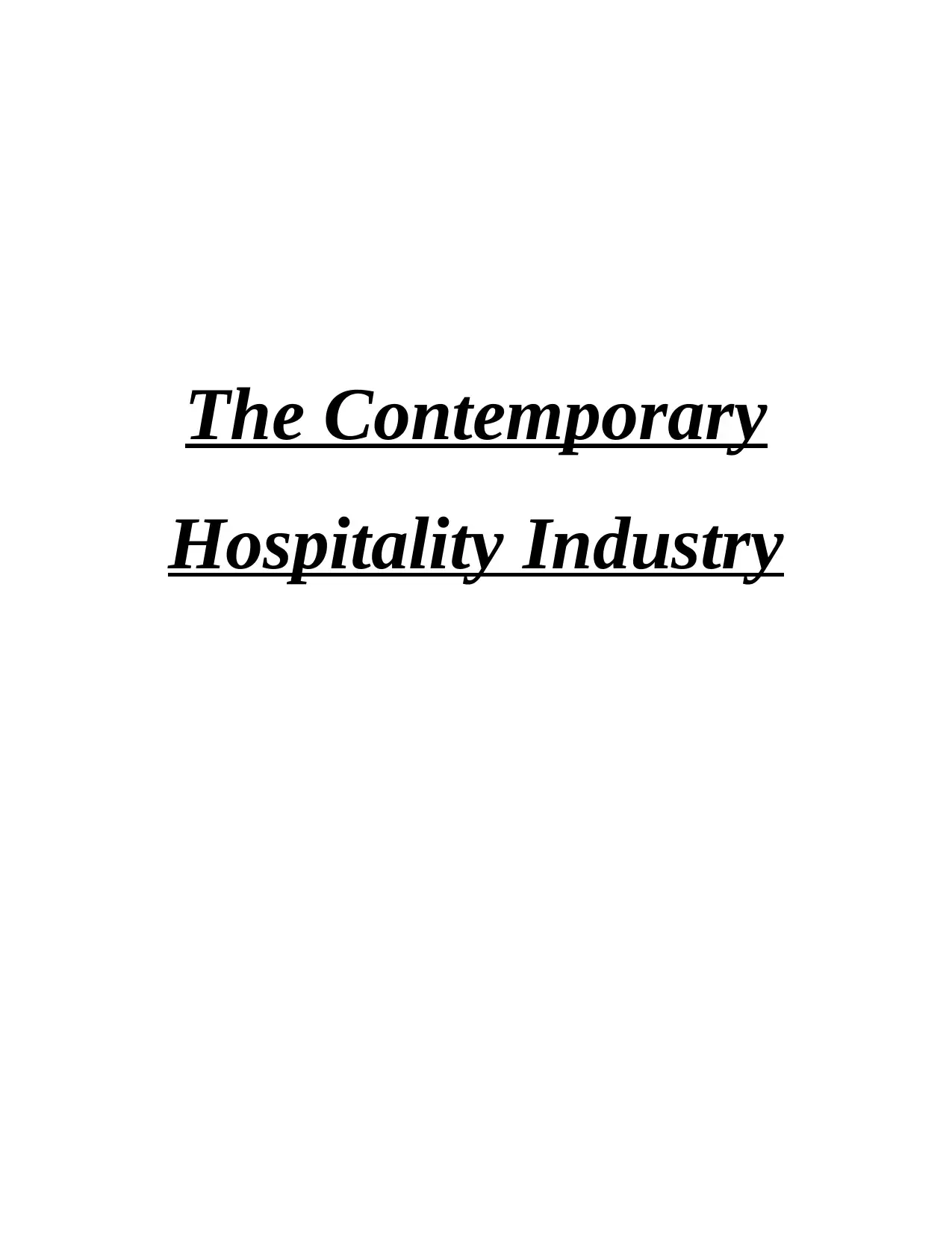
The Contemporary
Hospitality Industry
Hospitality Industry
Paraphrase This Document
Need a fresh take? Get an instant paraphrase of this document with our AI Paraphraser
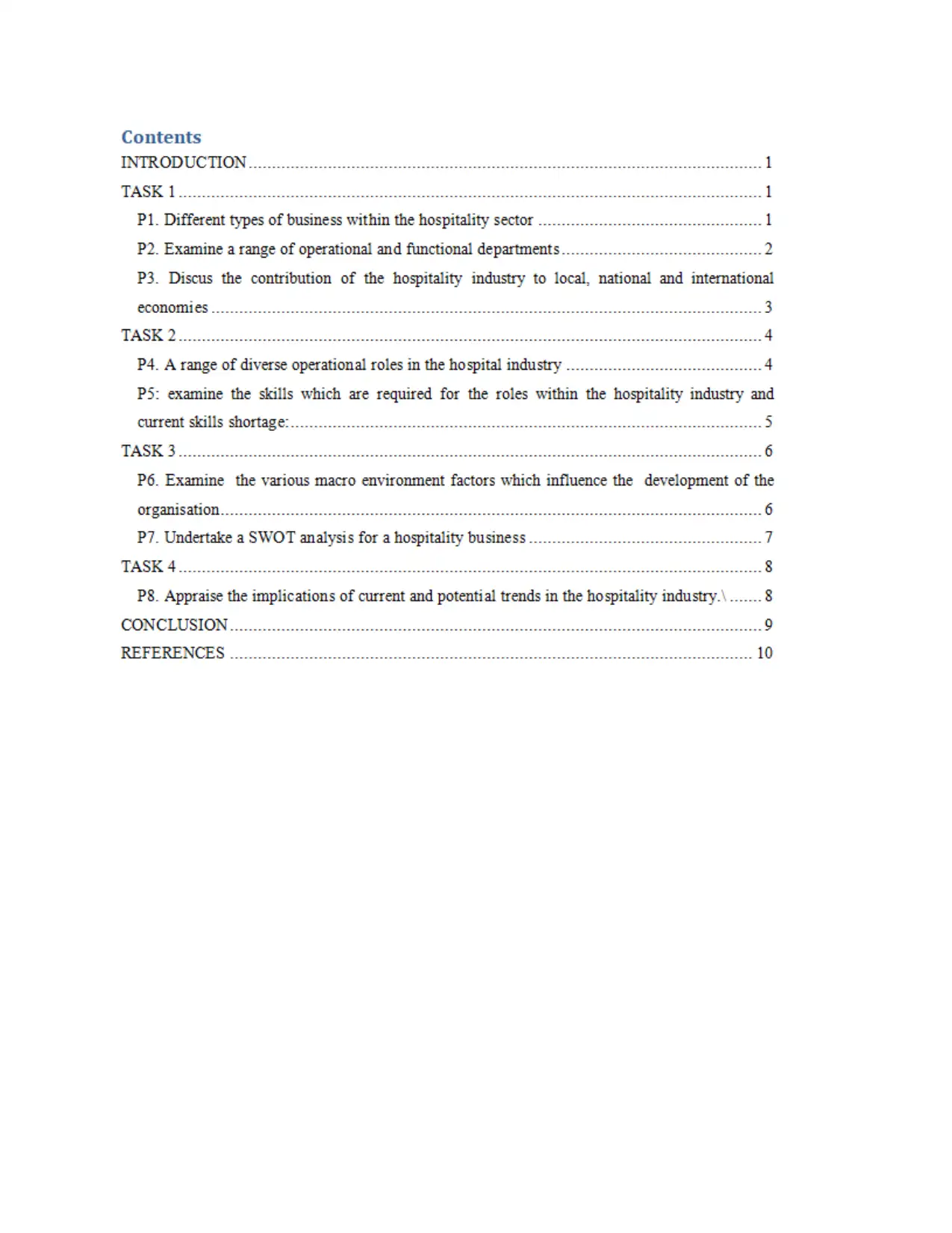

⊘ This is a preview!⊘
Do you want full access?
Subscribe today to unlock all pages.

Trusted by 1+ million students worldwide
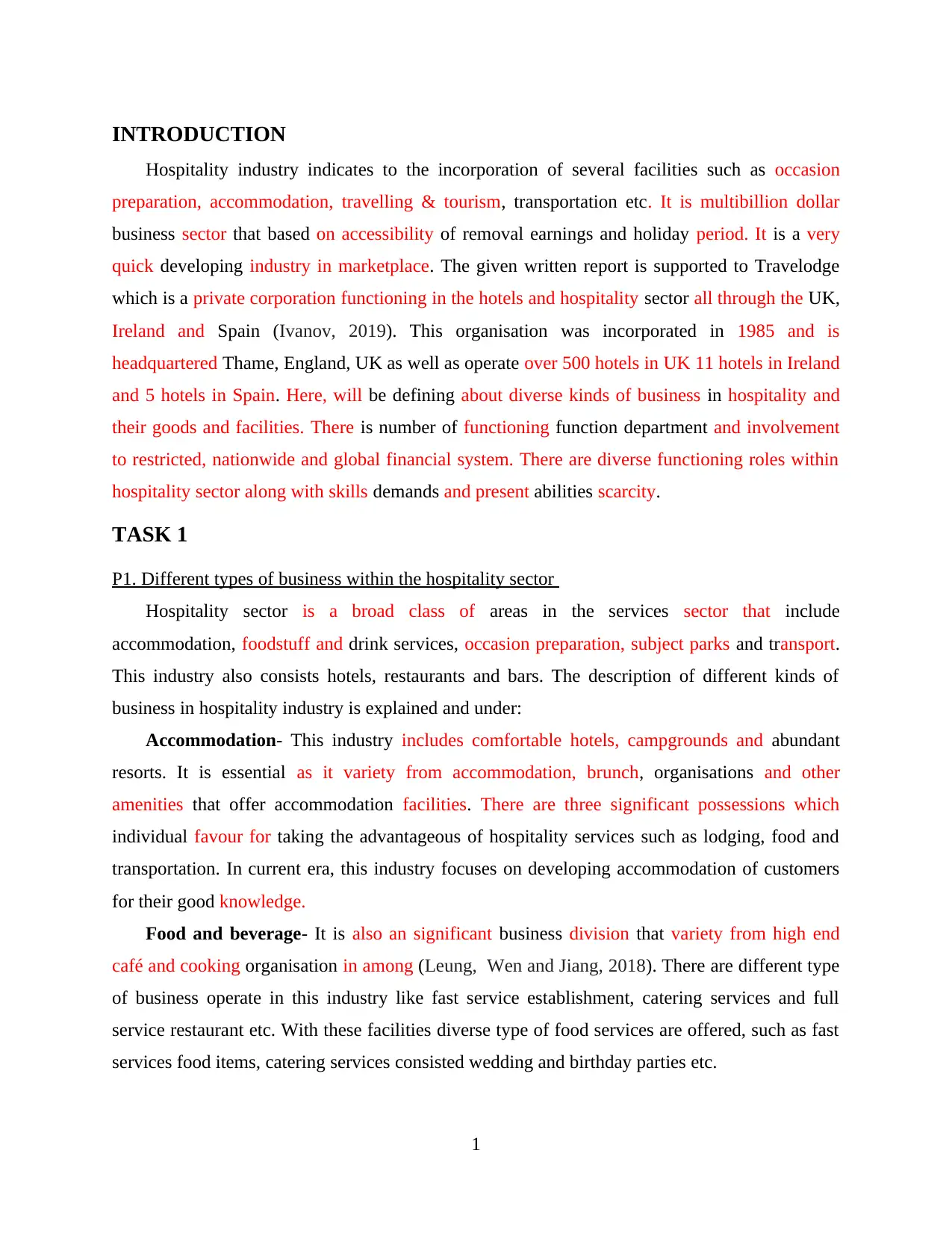
INTRODUCTION
Hospitality industry indicates to the incorporation of several facilities such as occasion
preparation, accommodation, travelling & tourism, transportation etc. It is multibillion dollar
business sector that based on accessibility of removal earnings and holiday period. It is a very
quick developing industry in marketplace. The given written report is supported to Travelodge
which is a private corporation functioning in the hotels and hospitality sector all through the UK,
Ireland and Spain (Ivanov, 2019). This organisation was incorporated in 1985 and is
headquartered Thame, England, UK as well as operate over 500 hotels in UK 11 hotels in Ireland
and 5 hotels in Spain. Here, will be defining about diverse kinds of business in hospitality and
their goods and facilities. There is number of functioning function department and involvement
to restricted, nationwide and global financial system. There are diverse functioning roles within
hospitality sector along with skills demands and present abilities scarcity.
TASK 1
P1. Different types of business within the hospitality sector
Hospitality sector is a broad class of areas in the services sector that include
accommodation, foodstuff and drink services, occasion preparation, subject parks and transport.
This industry also consists hotels, restaurants and bars. The description of different kinds of
business in hospitality industry is explained and under:
Accommodation- This industry includes comfortable hotels, campgrounds and abundant
resorts. It is essential as it variety from accommodation, brunch, organisations and other
amenities that offer accommodation facilities. There are three significant possessions which
individual favour for taking the advantageous of hospitality services such as lodging, food and
transportation. In current era, this industry focuses on developing accommodation of customers
for their good knowledge.
Food and beverage- It is also an significant business division that variety from high end
café and cooking organisation in among (Leung, Wen and Jiang, 2018). There are different type
of business operate in this industry like fast service establishment, catering services and full
service restaurant etc. With these facilities diverse type of food services are offered, such as fast
services food items, catering services consisted wedding and birthday parties etc.
1
Hospitality industry indicates to the incorporation of several facilities such as occasion
preparation, accommodation, travelling & tourism, transportation etc. It is multibillion dollar
business sector that based on accessibility of removal earnings and holiday period. It is a very
quick developing industry in marketplace. The given written report is supported to Travelodge
which is a private corporation functioning in the hotels and hospitality sector all through the UK,
Ireland and Spain (Ivanov, 2019). This organisation was incorporated in 1985 and is
headquartered Thame, England, UK as well as operate over 500 hotels in UK 11 hotels in Ireland
and 5 hotels in Spain. Here, will be defining about diverse kinds of business in hospitality and
their goods and facilities. There is number of functioning function department and involvement
to restricted, nationwide and global financial system. There are diverse functioning roles within
hospitality sector along with skills demands and present abilities scarcity.
TASK 1
P1. Different types of business within the hospitality sector
Hospitality sector is a broad class of areas in the services sector that include
accommodation, foodstuff and drink services, occasion preparation, subject parks and transport.
This industry also consists hotels, restaurants and bars. The description of different kinds of
business in hospitality industry is explained and under:
Accommodation- This industry includes comfortable hotels, campgrounds and abundant
resorts. It is essential as it variety from accommodation, brunch, organisations and other
amenities that offer accommodation facilities. There are three significant possessions which
individual favour for taking the advantageous of hospitality services such as lodging, food and
transportation. In current era, this industry focuses on developing accommodation of customers
for their good knowledge.
Food and beverage- It is also an significant business division that variety from high end
café and cooking organisation in among (Leung, Wen and Jiang, 2018). There are different type
of business operate in this industry like fast service establishment, catering services and full
service restaurant etc. With these facilities diverse type of food services are offered, such as fast
services food items, catering services consisted wedding and birthday parties etc.
1
Paraphrase This Document
Need a fresh take? Get an instant paraphrase of this document with our AI Paraphraser
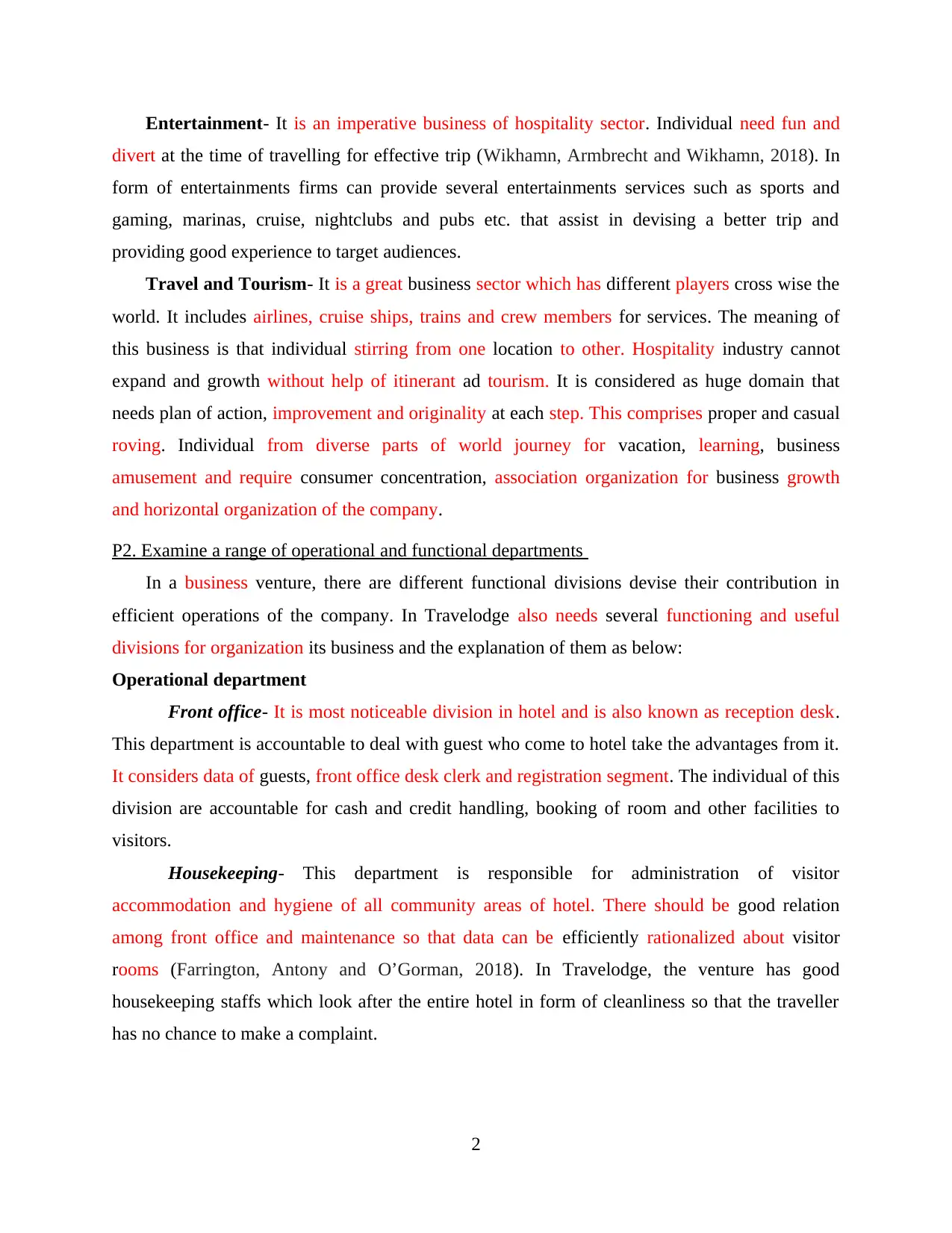
Entertainment- It is an imperative business of hospitality sector. Individual need fun and
divert at the time of travelling for effective trip (Wikhamn, Armbrecht and Wikhamn, 2018). In
form of entertainments firms can provide several entertainments services such as sports and
gaming, marinas, cruise, nightclubs and pubs etc. that assist in devising a better trip and
providing good experience to target audiences.
Travel and Tourism- It is a great business sector which has different players cross wise the
world. It includes airlines, cruise ships, trains and crew members for services. The meaning of
this business is that individual stirring from one location to other. Hospitality industry cannot
expand and growth without help of itinerant ad tourism. It is considered as huge domain that
needs plan of action, improvement and originality at each step. This comprises proper and casual
roving. Individual from diverse parts of world journey for vacation, learning, business
amusement and require consumer concentration, association organization for business growth
and horizontal organization of the company.
P2. Examine a range of operational and functional departments
In a business venture, there are different functional divisions devise their contribution in
efficient operations of the company. In Travelodge also needs several functioning and useful
divisions for organization its business and the explanation of them as below:
Operational department
Front office- It is most noticeable division in hotel and is also known as reception desk.
This department is accountable to deal with guest who come to hotel take the advantages from it.
It considers data of guests, front office desk clerk and registration segment. The individual of this
division are accountable for cash and credit handling, booking of room and other facilities to
visitors.
Housekeeping- This department is responsible for administration of visitor
accommodation and hygiene of all community areas of hotel. There should be good relation
among front office and maintenance so that data can be efficiently rationalized about visitor
rooms (Farrington, Antony and O’Gorman, 2018). In Travelodge, the venture has good
housekeeping staffs which look after the entire hotel in form of cleanliness so that the traveller
has no chance to make a complaint.
2
divert at the time of travelling for effective trip (Wikhamn, Armbrecht and Wikhamn, 2018). In
form of entertainments firms can provide several entertainments services such as sports and
gaming, marinas, cruise, nightclubs and pubs etc. that assist in devising a better trip and
providing good experience to target audiences.
Travel and Tourism- It is a great business sector which has different players cross wise the
world. It includes airlines, cruise ships, trains and crew members for services. The meaning of
this business is that individual stirring from one location to other. Hospitality industry cannot
expand and growth without help of itinerant ad tourism. It is considered as huge domain that
needs plan of action, improvement and originality at each step. This comprises proper and casual
roving. Individual from diverse parts of world journey for vacation, learning, business
amusement and require consumer concentration, association organization for business growth
and horizontal organization of the company.
P2. Examine a range of operational and functional departments
In a business venture, there are different functional divisions devise their contribution in
efficient operations of the company. In Travelodge also needs several functioning and useful
divisions for organization its business and the explanation of them as below:
Operational department
Front office- It is most noticeable division in hotel and is also known as reception desk.
This department is accountable to deal with guest who come to hotel take the advantages from it.
It considers data of guests, front office desk clerk and registration segment. The individual of this
division are accountable for cash and credit handling, booking of room and other facilities to
visitors.
Housekeeping- This department is responsible for administration of visitor
accommodation and hygiene of all community areas of hotel. There should be good relation
among front office and maintenance so that data can be efficiently rationalized about visitor
rooms (Farrington, Antony and O’Gorman, 2018). In Travelodge, the venture has good
housekeeping staffs which look after the entire hotel in form of cleanliness so that the traveller
has no chance to make a complaint.
2
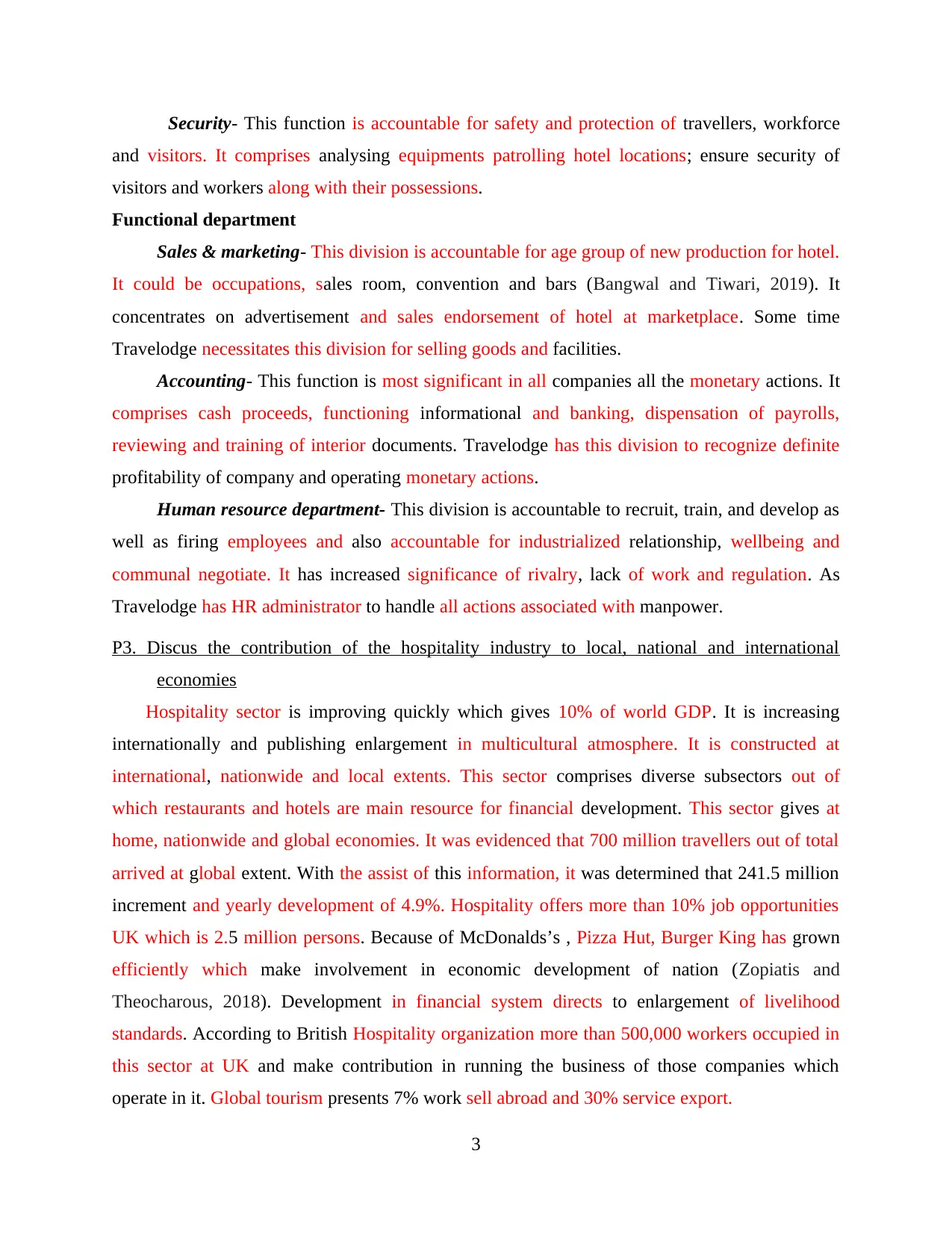
Security- This function is accountable for safety and protection of travellers, workforce
and visitors. It comprises analysing equipments patrolling hotel locations; ensure security of
visitors and workers along with their possessions.
Functional department
Sales & marketing- This division is accountable for age group of new production for hotel.
It could be occupations, sales room, convention and bars (Bangwal and Tiwari, 2019). It
concentrates on advertisement and sales endorsement of hotel at marketplace. Some time
Travelodge necessitates this division for selling goods and facilities.
Accounting- This function is most significant in all companies all the monetary actions. It
comprises cash proceeds, functioning informational and banking, dispensation of payrolls,
reviewing and training of interior documents. Travelodge has this division to recognize definite
profitability of company and operating monetary actions.
Human resource department- This division is accountable to recruit, train, and develop as
well as firing employees and also accountable for industrialized relationship, wellbeing and
communal negotiate. It has increased significance of rivalry, lack of work and regulation. As
Travelodge has HR administrator to handle all actions associated with manpower.
P3. Discus the contribution of the hospitality industry to local, national and international
economies
Hospitality sector is improving quickly which gives 10% of world GDP. It is increasing
internationally and publishing enlargement in multicultural atmosphere. It is constructed at
international, nationwide and local extents. This sector comprises diverse subsectors out of
which restaurants and hotels are main resource for financial development. This sector gives at
home, nationwide and global economies. It was evidenced that 700 million travellers out of total
arrived at global extent. With the assist of this information, it was determined that 241.5 million
increment and yearly development of 4.9%. Hospitality offers more than 10% job opportunities
UK which is 2.5 million persons. Because of McDonalds’s , Pizza Hut, Burger King has grown
efficiently which make involvement in economic development of nation (Zopiatis and
Theocharous, 2018). Development in financial system directs to enlargement of livelihood
standards. According to British Hospitality organization more than 500,000 workers occupied in
this sector at UK and make contribution in running the business of those companies which
operate in it. Global tourism presents 7% work sell abroad and 30% service export.
3
and visitors. It comprises analysing equipments patrolling hotel locations; ensure security of
visitors and workers along with their possessions.
Functional department
Sales & marketing- This division is accountable for age group of new production for hotel.
It could be occupations, sales room, convention and bars (Bangwal and Tiwari, 2019). It
concentrates on advertisement and sales endorsement of hotel at marketplace. Some time
Travelodge necessitates this division for selling goods and facilities.
Accounting- This function is most significant in all companies all the monetary actions. It
comprises cash proceeds, functioning informational and banking, dispensation of payrolls,
reviewing and training of interior documents. Travelodge has this division to recognize definite
profitability of company and operating monetary actions.
Human resource department- This division is accountable to recruit, train, and develop as
well as firing employees and also accountable for industrialized relationship, wellbeing and
communal negotiate. It has increased significance of rivalry, lack of work and regulation. As
Travelodge has HR administrator to handle all actions associated with manpower.
P3. Discus the contribution of the hospitality industry to local, national and international
economies
Hospitality sector is improving quickly which gives 10% of world GDP. It is increasing
internationally and publishing enlargement in multicultural atmosphere. It is constructed at
international, nationwide and local extents. This sector comprises diverse subsectors out of
which restaurants and hotels are main resource for financial development. This sector gives at
home, nationwide and global economies. It was evidenced that 700 million travellers out of total
arrived at global extent. With the assist of this information, it was determined that 241.5 million
increment and yearly development of 4.9%. Hospitality offers more than 10% job opportunities
UK which is 2.5 million persons. Because of McDonalds’s , Pizza Hut, Burger King has grown
efficiently which make involvement in economic development of nation (Zopiatis and
Theocharous, 2018). Development in financial system directs to enlargement of livelihood
standards. According to British Hospitality organization more than 500,000 workers occupied in
this sector at UK and make contribution in running the business of those companies which
operate in it. Global tourism presents 7% work sell abroad and 30% service export.
3
⊘ This is a preview!⊘
Do you want full access?
Subscribe today to unlock all pages.

Trusted by 1+ million students worldwide
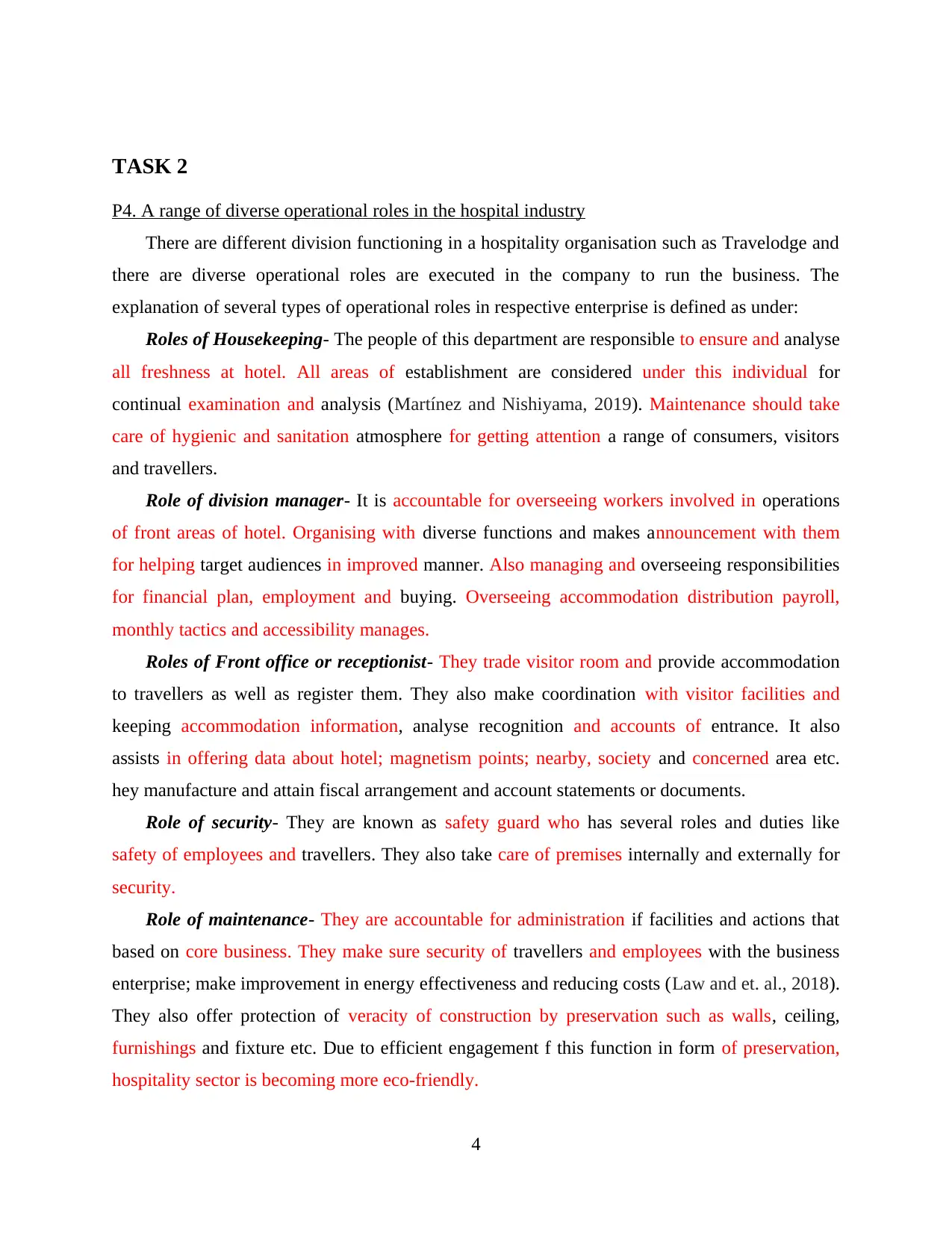
TASK 2
P4. A range of diverse operational roles in the hospital industry
There are different division functioning in a hospitality organisation such as Travelodge and
there are diverse operational roles are executed in the company to run the business. The
explanation of several types of operational roles in respective enterprise is defined as under:
Roles of Housekeeping- The people of this department are responsible to ensure and analyse
all freshness at hotel. All areas of establishment are considered under this individual for
continual examination and analysis (Martínez and Nishiyama, 2019). Maintenance should take
care of hygienic and sanitation atmosphere for getting attention a range of consumers, visitors
and travellers.
Role of division manager- It is accountable for overseeing workers involved in operations
of front areas of hotel. Organising with diverse functions and makes announcement with them
for helping target audiences in improved manner. Also managing and overseeing responsibilities
for financial plan, employment and buying. Overseeing accommodation distribution payroll,
monthly tactics and accessibility manages.
Roles of Front office or receptionist- They trade visitor room and provide accommodation
to travellers as well as register them. They also make coordination with visitor facilities and
keeping accommodation information, analyse recognition and accounts of entrance. It also
assists in offering data about hotel; magnetism points; nearby, society and concerned area etc.
hey manufacture and attain fiscal arrangement and account statements or documents.
Role of security- They are known as safety guard who has several roles and duties like
safety of employees and travellers. They also take care of premises internally and externally for
security.
Role of maintenance- They are accountable for administration if facilities and actions that
based on core business. They make sure security of travellers and employees with the business
enterprise; make improvement in energy effectiveness and reducing costs (Law and et. al., 2018).
They also offer protection of veracity of construction by preservation such as walls, ceiling,
furnishings and fixture etc. Due to efficient engagement f this function in form of preservation,
hospitality sector is becoming more eco-friendly.
4
P4. A range of diverse operational roles in the hospital industry
There are different division functioning in a hospitality organisation such as Travelodge and
there are diverse operational roles are executed in the company to run the business. The
explanation of several types of operational roles in respective enterprise is defined as under:
Roles of Housekeeping- The people of this department are responsible to ensure and analyse
all freshness at hotel. All areas of establishment are considered under this individual for
continual examination and analysis (Martínez and Nishiyama, 2019). Maintenance should take
care of hygienic and sanitation atmosphere for getting attention a range of consumers, visitors
and travellers.
Role of division manager- It is accountable for overseeing workers involved in operations
of front areas of hotel. Organising with diverse functions and makes announcement with them
for helping target audiences in improved manner. Also managing and overseeing responsibilities
for financial plan, employment and buying. Overseeing accommodation distribution payroll,
monthly tactics and accessibility manages.
Roles of Front office or receptionist- They trade visitor room and provide accommodation
to travellers as well as register them. They also make coordination with visitor facilities and
keeping accommodation information, analyse recognition and accounts of entrance. It also
assists in offering data about hotel; magnetism points; nearby, society and concerned area etc.
hey manufacture and attain fiscal arrangement and account statements or documents.
Role of security- They are known as safety guard who has several roles and duties like
safety of employees and travellers. They also take care of premises internally and externally for
security.
Role of maintenance- They are accountable for administration if facilities and actions that
based on core business. They make sure security of travellers and employees with the business
enterprise; make improvement in energy effectiveness and reducing costs (Law and et. al., 2018).
They also offer protection of veracity of construction by preservation such as walls, ceiling,
furnishings and fixture etc. Due to efficient engagement f this function in form of preservation,
hospitality sector is becoming more eco-friendly.
4
Paraphrase This Document
Need a fresh take? Get an instant paraphrase of this document with our AI Paraphraser
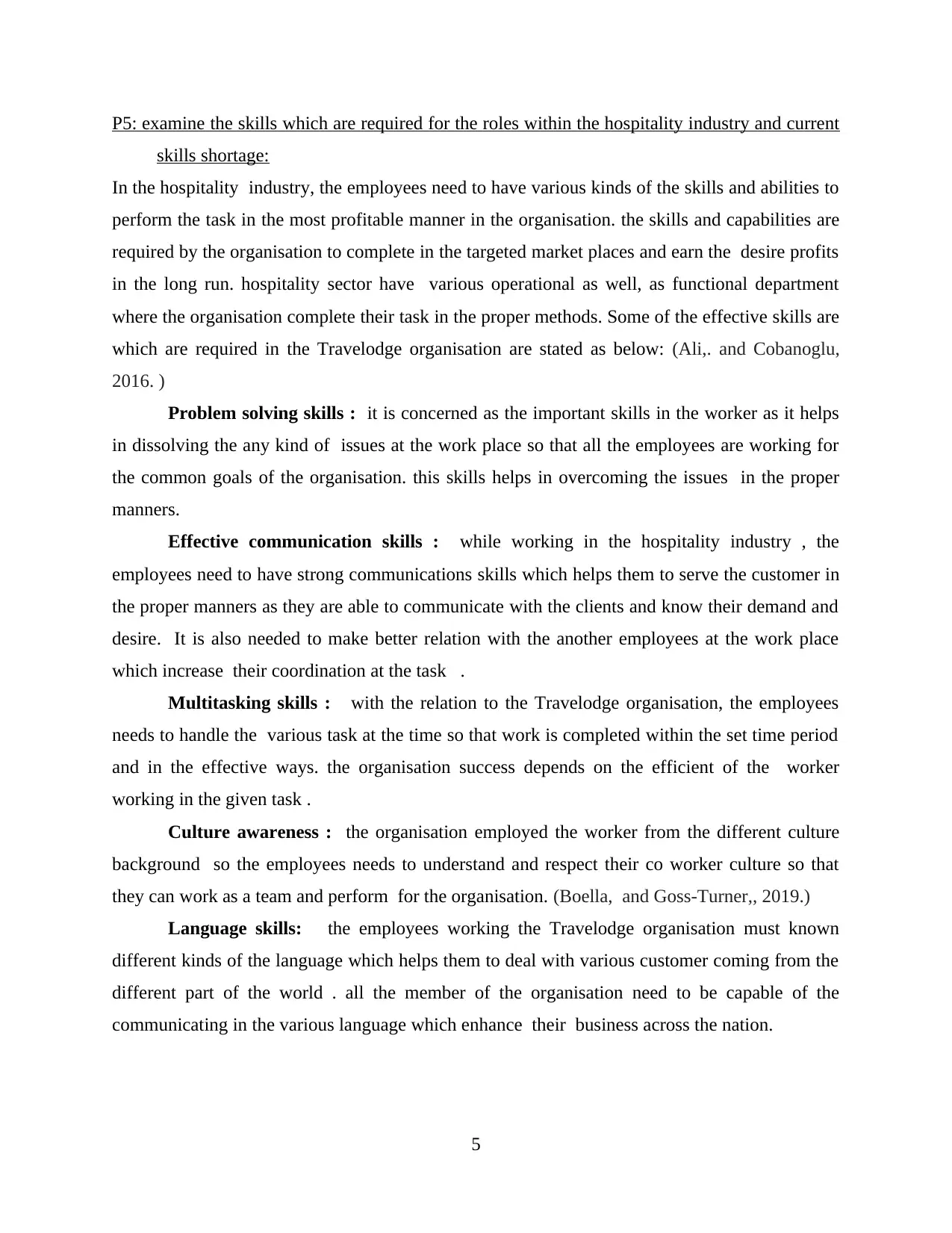
P5: examine the skills which are required for the roles within the hospitality industry and current
skills shortage:
In the hospitality industry, the employees need to have various kinds of the skills and abilities to
perform the task in the most profitable manner in the organisation. the skills and capabilities are
required by the organisation to complete in the targeted market places and earn the desire profits
in the long run. hospitality sector have various operational as well, as functional department
where the organisation complete their task in the proper methods. Some of the effective skills are
which are required in the Travelodge organisation are stated as below: (Ali,. and Cobanoglu,
2016. )
Problem solving skills : it is concerned as the important skills in the worker as it helps
in dissolving the any kind of issues at the work place so that all the employees are working for
the common goals of the organisation. this skills helps in overcoming the issues in the proper
manners.
Effective communication skills : while working in the hospitality industry , the
employees need to have strong communications skills which helps them to serve the customer in
the proper manners as they are able to communicate with the clients and know their demand and
desire. It is also needed to make better relation with the another employees at the work place
which increase their coordination at the task .
Multitasking skills : with the relation to the Travelodge organisation, the employees
needs to handle the various task at the time so that work is completed within the set time period
and in the effective ways. the organisation success depends on the efficient of the worker
working in the given task .
Culture awareness : the organisation employed the worker from the different culture
background so the employees needs to understand and respect their co worker culture so that
they can work as a team and perform for the organisation. (Boella, and Goss-Turner,, 2019.)
Language skills: the employees working the Travelodge organisation must known
different kinds of the language which helps them to deal with various customer coming from the
different part of the world . all the member of the organisation need to be capable of the
communicating in the various language which enhance their business across the nation.
5
skills shortage:
In the hospitality industry, the employees need to have various kinds of the skills and abilities to
perform the task in the most profitable manner in the organisation. the skills and capabilities are
required by the organisation to complete in the targeted market places and earn the desire profits
in the long run. hospitality sector have various operational as well, as functional department
where the organisation complete their task in the proper methods. Some of the effective skills are
which are required in the Travelodge organisation are stated as below: (Ali,. and Cobanoglu,
2016. )
Problem solving skills : it is concerned as the important skills in the worker as it helps
in dissolving the any kind of issues at the work place so that all the employees are working for
the common goals of the organisation. this skills helps in overcoming the issues in the proper
manners.
Effective communication skills : while working in the hospitality industry , the
employees need to have strong communications skills which helps them to serve the customer in
the proper manners as they are able to communicate with the clients and know their demand and
desire. It is also needed to make better relation with the another employees at the work place
which increase their coordination at the task .
Multitasking skills : with the relation to the Travelodge organisation, the employees
needs to handle the various task at the time so that work is completed within the set time period
and in the effective ways. the organisation success depends on the efficient of the worker
working in the given task .
Culture awareness : the organisation employed the worker from the different culture
background so the employees needs to understand and respect their co worker culture so that
they can work as a team and perform for the organisation. (Boella, and Goss-Turner,, 2019.)
Language skills: the employees working the Travelodge organisation must known
different kinds of the language which helps them to deal with various customer coming from the
different part of the world . all the member of the organisation need to be capable of the
communicating in the various language which enhance their business across the nation.
5
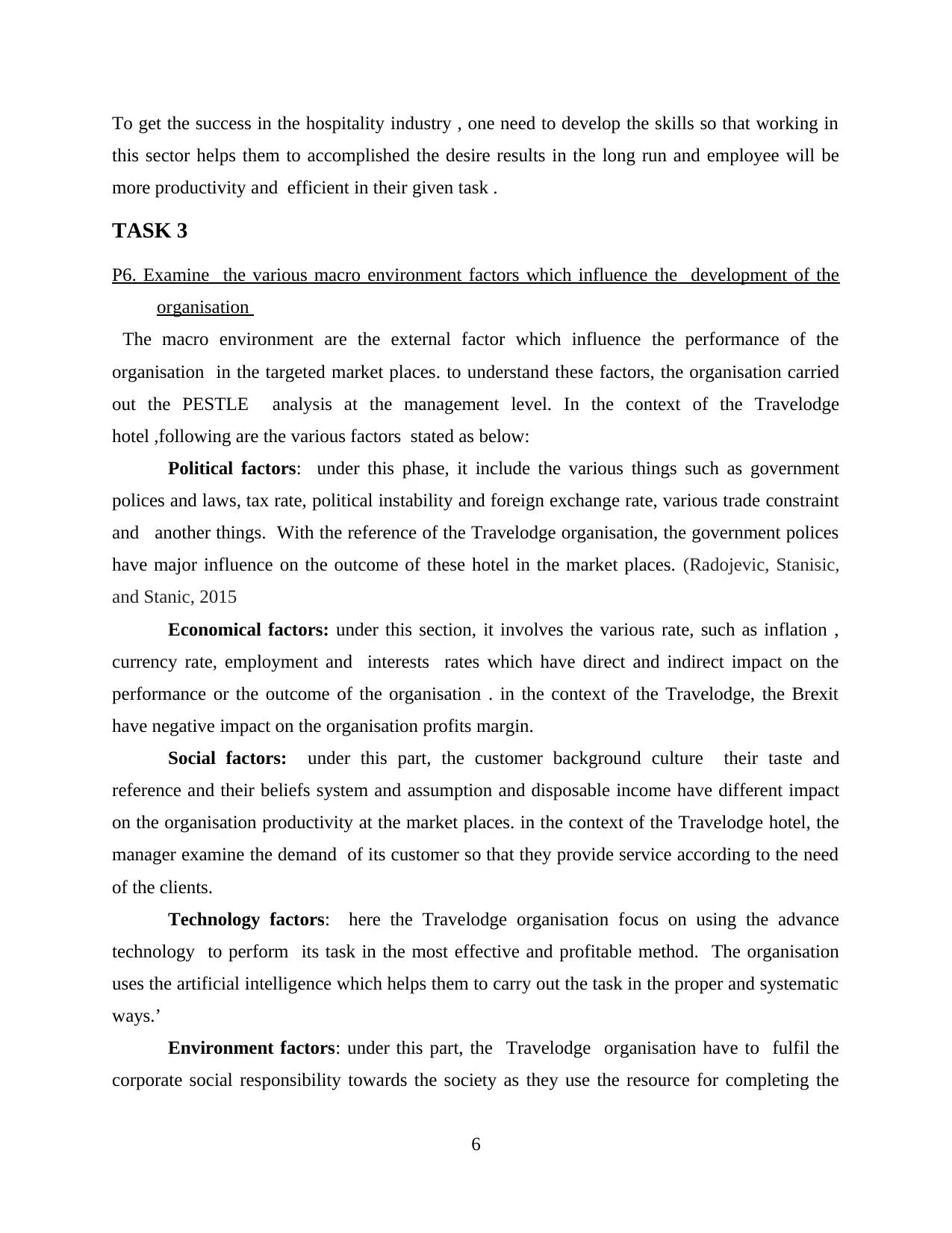
To get the success in the hospitality industry , one need to develop the skills so that working in
this sector helps them to accomplished the desire results in the long run and employee will be
more productivity and efficient in their given task .
TASK 3
P6. Examine the various macro environment factors which influence the development of the
organisation
The macro environment are the external factor which influence the performance of the
organisation in the targeted market places. to understand these factors, the organisation carried
out the PESTLE analysis at the management level. In the context of the Travelodge
hotel ,following are the various factors stated as below:
Political factors: under this phase, it include the various things such as government
polices and laws, tax rate, political instability and foreign exchange rate, various trade constraint
and another things. With the reference of the Travelodge organisation, the government polices
have major influence on the outcome of these hotel in the market places. (Radojevic, Stanisic,
and Stanic, 2015
Economical factors: under this section, it involves the various rate, such as inflation ,
currency rate, employment and interests rates which have direct and indirect impact on the
performance or the outcome of the organisation . in the context of the Travelodge, the Brexit
have negative impact on the organisation profits margin.
Social factors: under this part, the customer background culture their taste and
reference and their beliefs system and assumption and disposable income have different impact
on the organisation productivity at the market places. in the context of the Travelodge hotel, the
manager examine the demand of its customer so that they provide service according to the need
of the clients.
Technology factors: here the Travelodge organisation focus on using the advance
technology to perform its task in the most effective and profitable method. The organisation
uses the artificial intelligence which helps them to carry out the task in the proper and systematic
ways.’
Environment factors: under this part, the Travelodge organisation have to fulfil the
corporate social responsibility towards the society as they use the resource for completing the
6
this sector helps them to accomplished the desire results in the long run and employee will be
more productivity and efficient in their given task .
TASK 3
P6. Examine the various macro environment factors which influence the development of the
organisation
The macro environment are the external factor which influence the performance of the
organisation in the targeted market places. to understand these factors, the organisation carried
out the PESTLE analysis at the management level. In the context of the Travelodge
hotel ,following are the various factors stated as below:
Political factors: under this phase, it include the various things such as government
polices and laws, tax rate, political instability and foreign exchange rate, various trade constraint
and another things. With the reference of the Travelodge organisation, the government polices
have major influence on the outcome of these hotel in the market places. (Radojevic, Stanisic,
and Stanic, 2015
Economical factors: under this section, it involves the various rate, such as inflation ,
currency rate, employment and interests rates which have direct and indirect impact on the
performance or the outcome of the organisation . in the context of the Travelodge, the Brexit
have negative impact on the organisation profits margin.
Social factors: under this part, the customer background culture their taste and
reference and their beliefs system and assumption and disposable income have different impact
on the organisation productivity at the market places. in the context of the Travelodge hotel, the
manager examine the demand of its customer so that they provide service according to the need
of the clients.
Technology factors: here the Travelodge organisation focus on using the advance
technology to perform its task in the most effective and profitable method. The organisation
uses the artificial intelligence which helps them to carry out the task in the proper and systematic
ways.’
Environment factors: under this part, the Travelodge organisation have to fulfil the
corporate social responsibility towards the society as they use the resource for completing the
6
⊘ This is a preview!⊘
Do you want full access?
Subscribe today to unlock all pages.

Trusted by 1+ million students worldwide
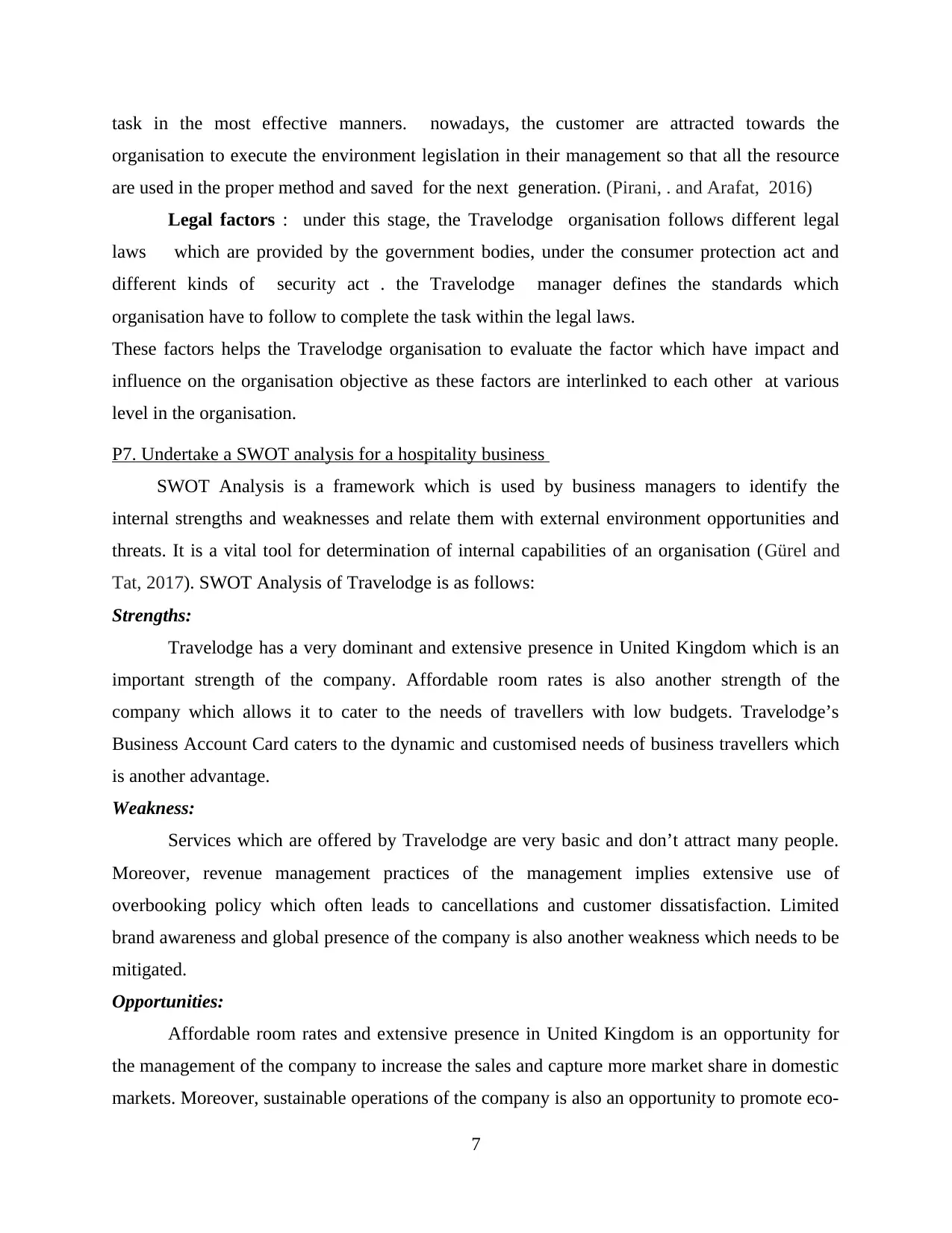
task in the most effective manners. nowadays, the customer are attracted towards the
organisation to execute the environment legislation in their management so that all the resource
are used in the proper method and saved for the next generation. (Pirani, . and Arafat, 2016)
Legal factors : under this stage, the Travelodge organisation follows different legal
laws which are provided by the government bodies, under the consumer protection act and
different kinds of security act . the Travelodge manager defines the standards which
organisation have to follow to complete the task within the legal laws.
These factors helps the Travelodge organisation to evaluate the factor which have impact and
influence on the organisation objective as these factors are interlinked to each other at various
level in the organisation.
P7. Undertake a SWOT analysis for a hospitality business
SWOT Analysis is a framework which is used by business managers to identify the
internal strengths and weaknesses and relate them with external environment opportunities and
threats. It is a vital tool for determination of internal capabilities of an organisation (Gürel and
Tat, 2017). SWOT Analysis of Travelodge is as follows:
Strengths:
Travelodge has a very dominant and extensive presence in United Kingdom which is an
important strength of the company. Affordable room rates is also another strength of the
company which allows it to cater to the needs of travellers with low budgets. Travelodge’s
Business Account Card caters to the dynamic and customised needs of business travellers which
is another advantage.
Weakness:
Services which are offered by Travelodge are very basic and don’t attract many people.
Moreover, revenue management practices of the management implies extensive use of
overbooking policy which often leads to cancellations and customer dissatisfaction. Limited
brand awareness and global presence of the company is also another weakness which needs to be
mitigated.
Opportunities:
Affordable room rates and extensive presence in United Kingdom is an opportunity for
the management of the company to increase the sales and capture more market share in domestic
markets. Moreover, sustainable operations of the company is also an opportunity to promote eco-
7
organisation to execute the environment legislation in their management so that all the resource
are used in the proper method and saved for the next generation. (Pirani, . and Arafat, 2016)
Legal factors : under this stage, the Travelodge organisation follows different legal
laws which are provided by the government bodies, under the consumer protection act and
different kinds of security act . the Travelodge manager defines the standards which
organisation have to follow to complete the task within the legal laws.
These factors helps the Travelodge organisation to evaluate the factor which have impact and
influence on the organisation objective as these factors are interlinked to each other at various
level in the organisation.
P7. Undertake a SWOT analysis for a hospitality business
SWOT Analysis is a framework which is used by business managers to identify the
internal strengths and weaknesses and relate them with external environment opportunities and
threats. It is a vital tool for determination of internal capabilities of an organisation (Gürel and
Tat, 2017). SWOT Analysis of Travelodge is as follows:
Strengths:
Travelodge has a very dominant and extensive presence in United Kingdom which is an
important strength of the company. Affordable room rates is also another strength of the
company which allows it to cater to the needs of travellers with low budgets. Travelodge’s
Business Account Card caters to the dynamic and customised needs of business travellers which
is another advantage.
Weakness:
Services which are offered by Travelodge are very basic and don’t attract many people.
Moreover, revenue management practices of the management implies extensive use of
overbooking policy which often leads to cancellations and customer dissatisfaction. Limited
brand awareness and global presence of the company is also another weakness which needs to be
mitigated.
Opportunities:
Affordable room rates and extensive presence in United Kingdom is an opportunity for
the management of the company to increase the sales and capture more market share in domestic
markets. Moreover, sustainable operations of the company is also an opportunity to promote eco-
7
Paraphrase This Document
Need a fresh take? Get an instant paraphrase of this document with our AI Paraphraser
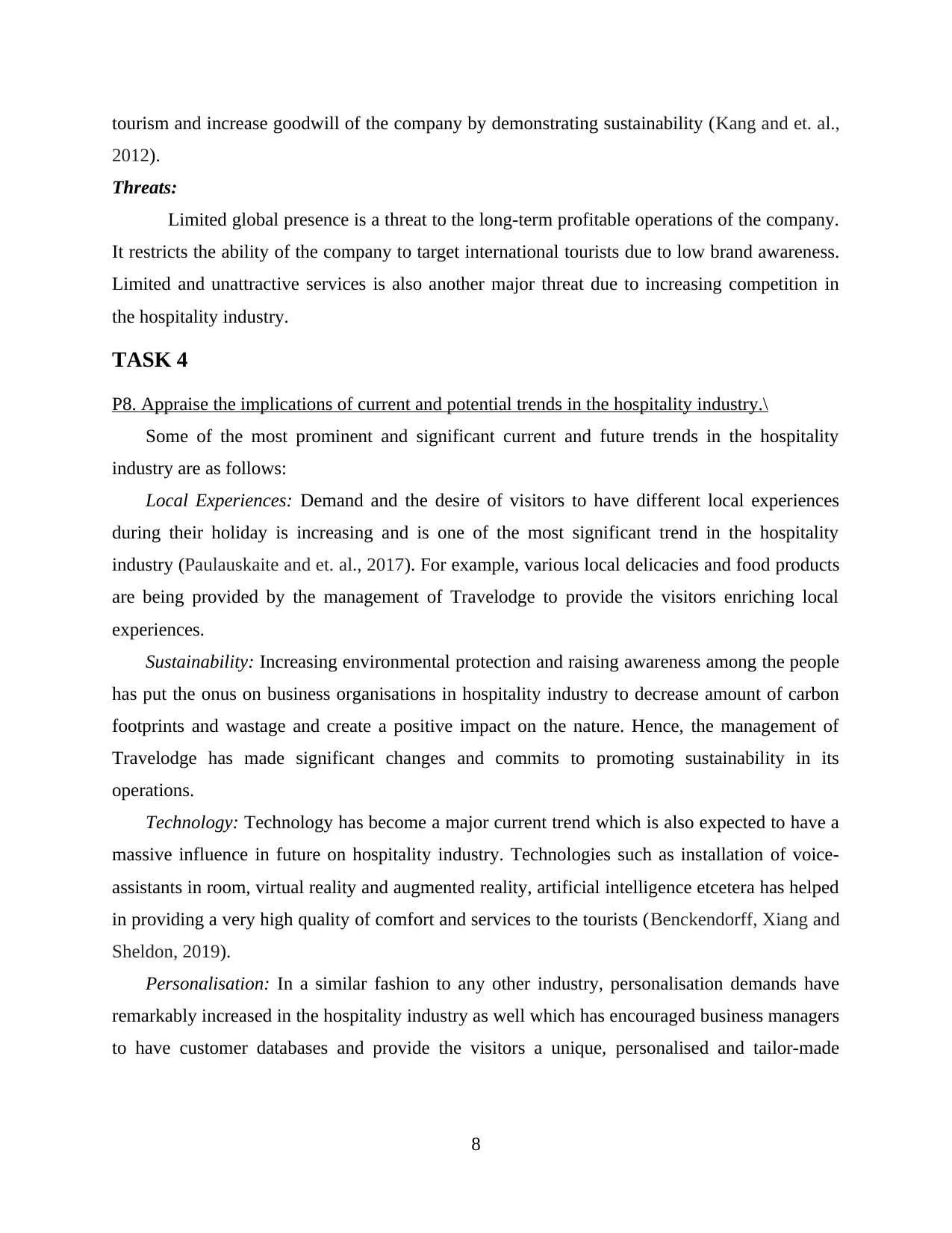
tourism and increase goodwill of the company by demonstrating sustainability (Kang and et. al.,
2012).
Threats:
Limited global presence is a threat to the long-term profitable operations of the company.
It restricts the ability of the company to target international tourists due to low brand awareness.
Limited and unattractive services is also another major threat due to increasing competition in
the hospitality industry.
TASK 4
P8. Appraise the implications of current and potential trends in the hospitality industry.\
Some of the most prominent and significant current and future trends in the hospitality
industry are as follows:
Local Experiences: Demand and the desire of visitors to have different local experiences
during their holiday is increasing and is one of the most significant trend in the hospitality
industry (Paulauskaite and et. al., 2017). For example, various local delicacies and food products
are being provided by the management of Travelodge to provide the visitors enriching local
experiences.
Sustainability: Increasing environmental protection and raising awareness among the people
has put the onus on business organisations in hospitality industry to decrease amount of carbon
footprints and wastage and create a positive impact on the nature. Hence, the management of
Travelodge has made significant changes and commits to promoting sustainability in its
operations.
Technology: Technology has become a major current trend which is also expected to have a
massive influence in future on hospitality industry. Technologies such as installation of voice-
assistants in room, virtual reality and augmented reality, artificial intelligence etcetera has helped
in providing a very high quality of comfort and services to the tourists (Benckendorff, Xiang and
Sheldon, 2019).
Personalisation: In a similar fashion to any other industry, personalisation demands have
remarkably increased in the hospitality industry as well which has encouraged business managers
to have customer databases and provide the visitors a unique, personalised and tailor-made
8
2012).
Threats:
Limited global presence is a threat to the long-term profitable operations of the company.
It restricts the ability of the company to target international tourists due to low brand awareness.
Limited and unattractive services is also another major threat due to increasing competition in
the hospitality industry.
TASK 4
P8. Appraise the implications of current and potential trends in the hospitality industry.\
Some of the most prominent and significant current and future trends in the hospitality
industry are as follows:
Local Experiences: Demand and the desire of visitors to have different local experiences
during their holiday is increasing and is one of the most significant trend in the hospitality
industry (Paulauskaite and et. al., 2017). For example, various local delicacies and food products
are being provided by the management of Travelodge to provide the visitors enriching local
experiences.
Sustainability: Increasing environmental protection and raising awareness among the people
has put the onus on business organisations in hospitality industry to decrease amount of carbon
footprints and wastage and create a positive impact on the nature. Hence, the management of
Travelodge has made significant changes and commits to promoting sustainability in its
operations.
Technology: Technology has become a major current trend which is also expected to have a
massive influence in future on hospitality industry. Technologies such as installation of voice-
assistants in room, virtual reality and augmented reality, artificial intelligence etcetera has helped
in providing a very high quality of comfort and services to the tourists (Benckendorff, Xiang and
Sheldon, 2019).
Personalisation: In a similar fashion to any other industry, personalisation demands have
remarkably increased in the hospitality industry as well which has encouraged business managers
to have customer databases and provide the visitors a unique, personalised and tailor-made
8
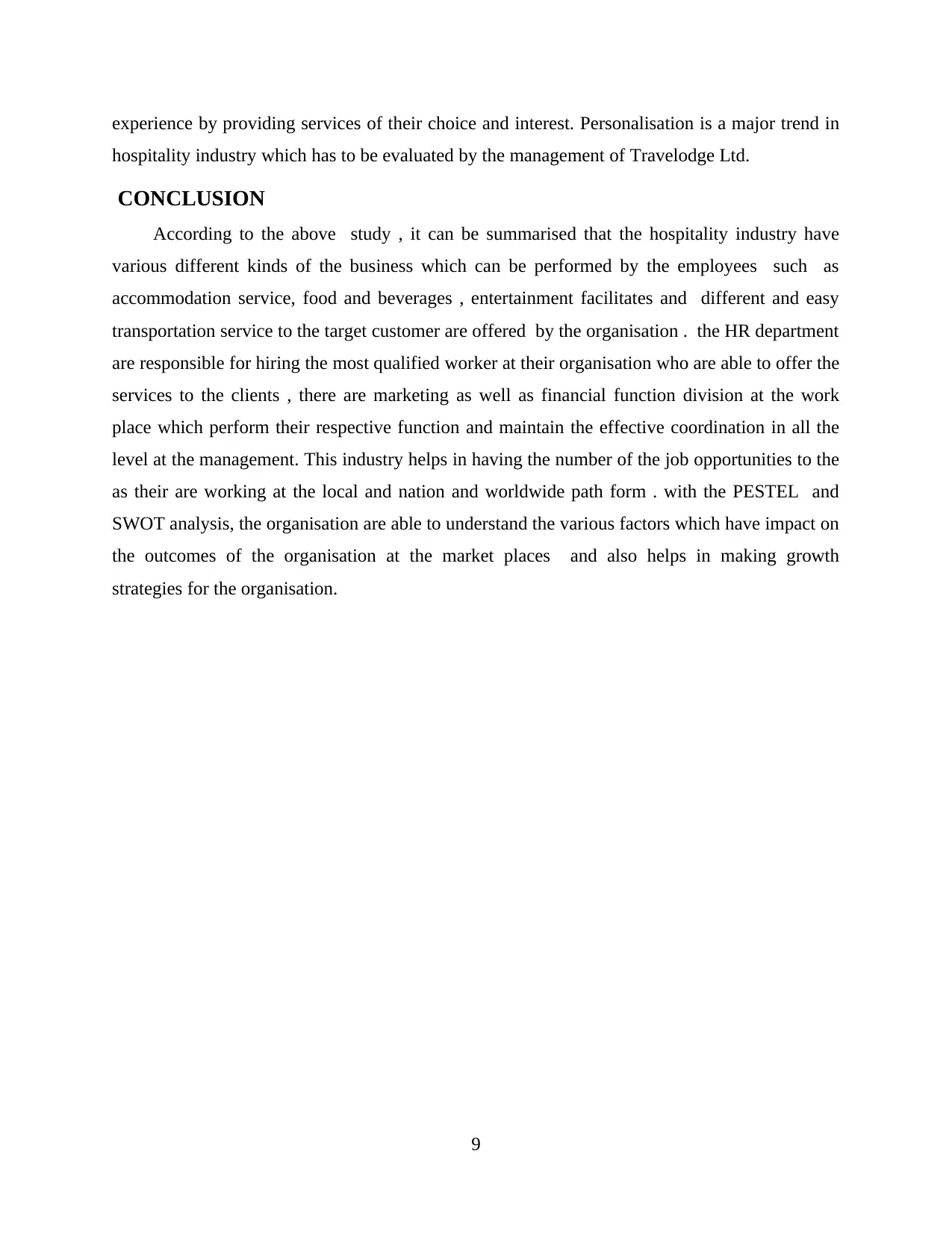
experience by providing services of their choice and interest. Personalisation is a major trend in
hospitality industry which has to be evaluated by the management of Travelodge Ltd.
CONCLUSION
According to the above study , it can be summarised that the hospitality industry have
various different kinds of the business which can be performed by the employees such as
accommodation service, food and beverages , entertainment facilitates and different and easy
transportation service to the target customer are offered by the organisation . the HR department
are responsible for hiring the most qualified worker at their organisation who are able to offer the
services to the clients , there are marketing as well as financial function division at the work
place which perform their respective function and maintain the effective coordination in all the
level at the management. This industry helps in having the number of the job opportunities to the
as their are working at the local and nation and worldwide path form . with the PESTEL and
SWOT analysis, the organisation are able to understand the various factors which have impact on
the outcomes of the organisation at the market places and also helps in making growth
strategies for the organisation.
9
hospitality industry which has to be evaluated by the management of Travelodge Ltd.
CONCLUSION
According to the above study , it can be summarised that the hospitality industry have
various different kinds of the business which can be performed by the employees such as
accommodation service, food and beverages , entertainment facilitates and different and easy
transportation service to the target customer are offered by the organisation . the HR department
are responsible for hiring the most qualified worker at their organisation who are able to offer the
services to the clients , there are marketing as well as financial function division at the work
place which perform their respective function and maintain the effective coordination in all the
level at the management. This industry helps in having the number of the job opportunities to the
as their are working at the local and nation and worldwide path form . with the PESTEL and
SWOT analysis, the organisation are able to understand the various factors which have impact on
the outcomes of the organisation at the market places and also helps in making growth
strategies for the organisation.
9
⊘ This is a preview!⊘
Do you want full access?
Subscribe today to unlock all pages.

Trusted by 1+ million students worldwide
1 out of 14
Related Documents
Your All-in-One AI-Powered Toolkit for Academic Success.
+13062052269
info@desklib.com
Available 24*7 on WhatsApp / Email
![[object Object]](/_next/static/media/star-bottom.7253800d.svg)
Unlock your academic potential
Copyright © 2020–2026 A2Z Services. All Rights Reserved. Developed and managed by ZUCOL.





